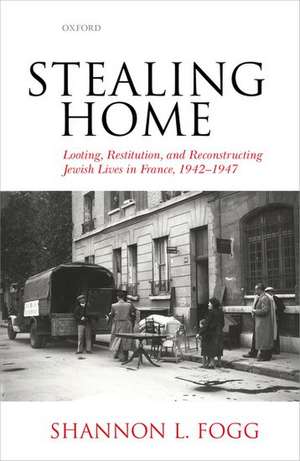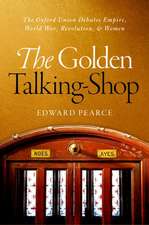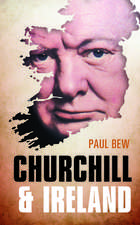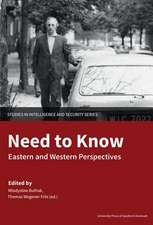Stealing Home: Looting, Restitution, and Reconstructing Jewish Lives in France, 1942-1947
Autor Shannon L. Foggen Limba Engleză Hardback – 7 dec 2016
Preț: 611.94 lei
Preț vechi: 879.17 lei
-30% Nou
Puncte Express: 918
Preț estimativ în valută:
117.13€ • 127.27$ • 98.45£
117.13€ • 127.27$ • 98.45£
Carte tipărită la comandă
Livrare economică 10-16 aprilie
Preluare comenzi: 021 569.72.76
Specificații
ISBN-13: 9780198787129
ISBN-10: 019878712X
Pagini: 214
Dimensiuni: 162 x 240 x 18 mm
Greutate: 0.46 kg
Editura: OUP OXFORD
Colecția OUP Oxford
Locul publicării:Oxford, United Kingdom
ISBN-10: 019878712X
Pagini: 214
Dimensiuni: 162 x 240 x 18 mm
Greutate: 0.46 kg
Editura: OUP OXFORD
Colecția OUP Oxford
Locul publicării:Oxford, United Kingdom
Recenzii
Fogg's richly documented Stealing Home resonates well beyond its time frame.
All in all Shannon Fogg has added an important study of the Vichy period. She has labored vigorously in order to reach information about different levels of society and has produced a finely crafted and sensitive historical work based on a truly commendable gift for archival research and an excellent command of the relevant historical literature.
Fogg underscores that hers is a social history interested in discovering the human impact on survivors who returned to Paris to find their apartments occupied by others and the furnishings gone. To this end, she has looked at memoirs and oral interviews to understand the sociological and psychological implications of reconstructing one's life after several harrowing years of absence ... Fogg makes the powerful point that what she terms mémocide, the killing of memories, accompanied genocide.
Fogg's treatment of a difficult and complex topic is well-researched, fluidly written and impressive. It aids our understanding of the Holocaust and its aftermath in France, while also deepening our knowledge of he reconstruction of Europe and post-war gender relations.
Stealing Home, however, is more than a grim catalogue of theft. Fogg's real concern lies with what Jewish survivors encountered when they struggled home from camps in the winter of 1944 ... At a moment when xenophobia and racism are again on the rise ... Stealing Home make[s] uneasy reading.
All in all Shannon Fogg has added an important study of the Vichy period. She has labored vigorously in order to reach information about different levels of society and has produced a finely crafted and sensitive historical work based on a truly commendable gift for archival research and an excellent command of the relevant historical literature.
Fogg underscores that hers is a social history interested in discovering the human impact on survivors who returned to Paris to find their apartments occupied by others and the furnishings gone. To this end, she has looked at memoirs and oral interviews to understand the sociological and psychological implications of reconstructing one's life after several harrowing years of absence ... Fogg makes the powerful point that what she terms mémocide, the killing of memories, accompanied genocide.
Fogg's treatment of a difficult and complex topic is well-researched, fluidly written and impressive. It aids our understanding of the Holocaust and its aftermath in France, while also deepening our knowledge of he reconstruction of Europe and post-war gender relations.
Stealing Home, however, is more than a grim catalogue of theft. Fogg's real concern lies with what Jewish survivors encountered when they struggled home from camps in the winter of 1944 ... At a moment when xenophobia and racism are again on the rise ... Stealing Home make[s] uneasy reading.
Notă biografică
Shannon L. Fogg is professor of history at Missouri University of Science and Technology and the author of The Politics of Everyday Life in Vichy France: Foreigners, Undesirables, and Strangers.











